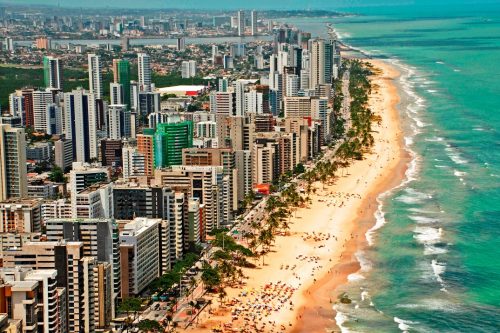
Unfortunately marred by a recent conflict, Ivory Coast should never be forgotten by travelers. This West African country is a jewel displaying a full array of natural colors. The country is covered by white beaches fringing green rain forests dotted with yellow savanna patches, surrounded by brown mountains and blue lakes. Taï National Park hides pygmy hippopotamuses and chimpanzees. From the hyper modernism of Abidjan to the classical architecture of Yamoussoukro and remote traditional fishing villages, socioeconomic contrasts are striking in Ivory Coast. Culture has a great importance in the country and Ivory Coast is especially renowned for its music and exceptional wooden sculptures.
HEALTH INFORMATION
We make every effort to ensure that the information posted on our website is up to date and accurate according to the latest public health recommendations; however, it is impossible for us to make changes on a daily basis.
For the most current travel health recommendations, please call our clinic as make an appointment with one of our travel health professionals.
CÔTE D’IVOIRE (IVORY COAST) – RECOMMENDED VACCINES
| Hepatitis A | Recommended for all travelers. |
| Hepatitis B | Recommended for all travelers. |
| Causes, Symptoms & Treatment – Typhoid fever | Recommended for all travelers. |
| Tetanus – Diphteria – Pertussis Vaccine | Tetanus: In exceptional circumstances (eg, stay in a region where access to health care is limited), for a person aged 18 years or older, 1 dose of DT may be given if 5 years or more has elapsed since the last dose. Otherwise, one booster dose at the age of 50*. Pertussis (Whooping Cough): 1 dose is recommended for pregnant women, for every pregnancy, regardless of immunization history and the interval since the last dose (betwen week 26 and 32). *Only applicable for Quebec. |
| Polio | One-time booster recommended for any adult traveler who completed the childhood series but never had polio vaccine as an adult (after 18 years old only). |
| Measles – Rubella – Mumps | Two doses recommended for all travelers born after 1970, if not previously given. |
| Cholera | For humanitarian workers and health care providers. |
| The Yellow Fever Vaccine | A proof of vaccination against yellow fever may be required upon entry in to this country. Some travellers may not be eligible to receive this vaccine. Please enquire with your health care professional regarding your specific details. It is important to note that the vaccine should be administered at least 10 days prior to your departure. For further information, please consult with the World Health Organization (WHO) website: https://www.who.int/ith/ith- |
| Meningitis | Recommended for all travellers during the season(s). Consider immunization for specific groups or itineraries outside the dry season |
| Flu – Influenza | Seasonal influenza occurs worldwide. The flu season usually runs from November to April in the northern hemisphere, between April and October in the southern hemisphere and year round in the tropics. Influenza (flu) is caused by a virus spread from person to person through coughing and sneezing or by touching infected surfaces. Everyone 6 months and older should get a flu vaccine yearly. Vaccine is recommended 14 days prior to departure. |
| Routine vaccines (dCaT, Polio, Meningococcal, Shingles, Pneumococcal, Hepatitis B, HPV, MMR & Varicella) | Recommended for all travelers |
| African Tick Bite Fever | Presence. All travellers should protect themselves against tick bites. |
| Transmission, Symptoms and Prevention – Rabies | For travelers at high risk of animal bites or being involved in activities with bats, dogs and other mammals. Clients who plan to visit remote areas may consider receiving this vaccine. Important to note the pre-exposure rabies vaccine is administered in 2 doses with one week interval between doses. Post-exposure vaccination is always recommended, even for those previously vaccinated. |
| Schistosomiasis | Avoid swimming in fresh water. |
| Turista – Traveler’s Diarrhea (ETEC) | Talk to your health care professional about the risks and precautionary measures to take, as well as the Dukoral® vaccine. Important to note that the Dukoral vaccine is an oral vaccine given in 2 doses, recommended at least 2 weeks prior to departure. |
| Malaria | Malaria is present in this country. The risk may be region specific. Prophylaxis measures to be discussed with the health care professional. |
| Dengue Fever, Chikungunya and/or Zika | There are many illnesses that are transmitted via mosquito bites and unfortunately we do not have vaccines to protect us against most of them. It is important to inquire with your healthcare professional regarding the specific risks and the different illnesses presently in circulation. |
RECOMMENDED MEDICATIONS
| Antimalarials Recommended | Malarone, Doxycycline or Mefloquine |
| Antibiotics Traveler’s Diarrhea | Azithromycin or Suprax |
MEDICAL CARE
In Ivory Coast, the public health care system is of very poor quality. It is strongly advised that you go to a private medical establishment if you require medical assistance in the country. The Polyclinique Internationale Ste Anne Marie and the Clinique les Bleuets are good addresses in Abidjan. These are the main private medical establishments in Ivory Coast. In rural areas, small public health care centers provide medical care of medium quality. They usually suffer from serious lacks of medical equipment and qualified staff.
If you need an ambulance, call 185.
Access to medicines is very bad in Ivory Coast. It is thus essential that you bring your own medical supplies in sufficient quantities.
SECURITY ABROAD
Rogue security forces and other armed groups engage in banditry and extortion in the western regions. Clashes between armed groups and the security forces have taken place in the area.
CANADIAN EMBASSY
Emergency services
In case of emergency, dial:
- police: 170 / 110 / 111
- medical assistance: 185
- firefighters: 180
